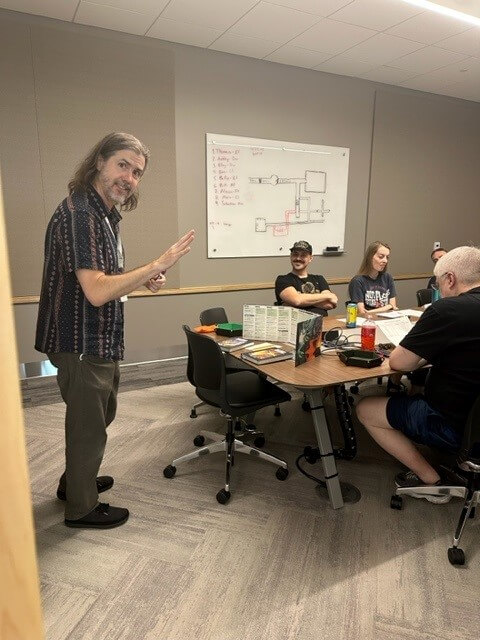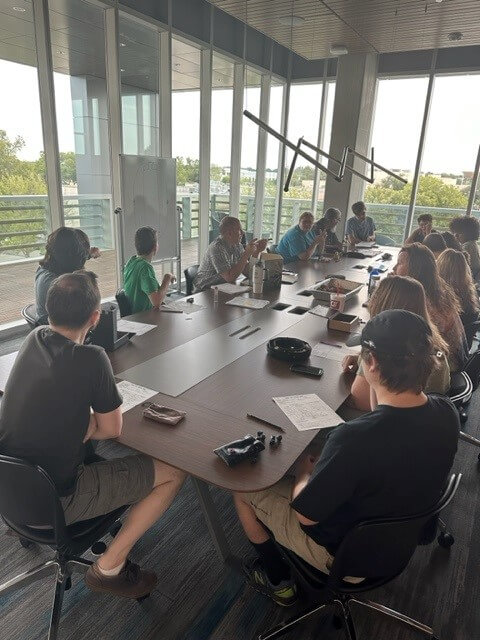Here at Round Rock Public Library, we have many programs for patrons of all ages. These can be fun events like a flute/drum circle, the inspirational and touching moments experienced at a children’s storytime, or educational classes with topics from Basic Computers Skills to Growing Better Succulents. One program we offer for adults that combines all three of these angles is our Old-School Dungeons and Dragons game night.
Held on the 1st and 3rd Tuesday of every month, from 6 pm to 8:30 attending patrons can experience the joys of tabletop role-playing games (TTRPGs). These sorts of games involve players choosing a character to play with various statistics modeling real-world abilities: how strong or smart your character is, what skills they have, and other considerations. Dungeons and Dragons, invented in the 1970s by Gary Gygax and David Arneson, was the first game of this kind, where you play the role of an imagined character and operate in a world with perils and opportunities. Players gain new skills and improve the skills they already started with by receiving experience points; the more points you gain, the more skilled your character becomes. A referee, in D&D called a Dungeon Master, (DM), invents the story, comes up with the challenges, assigns experience points to players based on what they accomplish, and arbitrates what is possible for the characters within the framework of the rules system. The players just do their best to survive and achieve whatever goals they can imagine!
So, you might ask, ‘this sounds like a fun pastime, but how can it be educational or inspirational’? Let’s start with education. D&D broadens awareness and knowledge that can certainly apply to the real world. Players deal with local imagined economies that fluctuate depending on what valuable items they sell, once they try to sell too much loot, their later acquisitions are worth much less, so players through roleplaying deal with basic economic concepts like supply and demand. They even experience the concept of negotiating prices, both in what they sell or buy. Depending on what choices they make or conundrums the Dungeon Master offers, players deal with local taxes, crop yields, aftermaths and cleanups from natural (often supernatural) disasters, considerations of social class within a society, administering employees, and even more esoteric concepts like how to balance the preferences of competing local religions. Many of the people who love to decry the performance of government employees would benefit from playing a game where they practice running a town as the local nobility, even within the medieval setting, the frustrations and difficulties of accommodating and answering to stake holders quickly become apparent if the game is being run by a thoughtful DM!
But the educational benefits are not always this subtle. D&D is a game of constant basic math, adding and subtracting multiple small number amounts, multiplying large numbers when converting treasure values, using and multiplying percentiles almost constantly to determine action outcomes, etc. The basic math is so constant that it quickly becomes obvious that using a calculator for these things drags down the pace of the game, so everyone is essentially compelled to practice doing math in their head, which is very good for our brains!
And the other core educational component, reading comprehension, is even more bolstered by this game. To be blunt, this is a game designed by very bookish people, so high-falutin’ words are a constant! Crack open any of the original D&D books, (later editions unfortunately seriously lowered the vocabulary threshold of their texts, one of the many reasons RRPL favors the old-school versions), and you’ll see words like: oligarchy, latent, esoteric, morale, aerial, matrix, encumbrance, excises, miscibility, etc. And those are just in the first couple of pages of one of the books! It’s a proven benefit for people of all ages to be consistently exposed to and work with more complex language, and that’s a constant while playing D&D.
Reading is also integral to success in the game, the more thoroughly a player knows the rules and options of the game system, the better they’ll do. So, the players get more experience points the more they achieve, and a lot of what they can achieve is found within a thorough understanding of how the game mechanics work, so deep reading is rewarded constantly in D&D. The inspirational element of D&D is best witnessed in person and is difficult to describe. Just as our real lives are dominated by random variables we have little control over, D&D models this reality by having players roll dice to see if their actions and efforts succeed or not. It is a sight to behold to witness a player whose character has progressed far but is suddenly in a moment of extreme deadly peril, only to roll a low-percentage chance value and succeed. It’s much better than gambling, because the only risk is in the imagination, but the risk still feels akin to putting up the kids’ college fund during a poker game. Also, even though the Dungeon Master is supposed to be a neutral arbiter of game outcomes, in practice D&D is a matching of wits between the players and the DM, and when players figure out a strategy or tactic that stumps the DM’s planned encounter, the thrilled team spirit is palpable. Finally, a good D&D game is truly a creative writing project, where the players and the DM are essentially writing a story together. When the story becomes surprising, or profound or moving or exciting, everyone not only gets to enjoy those emotions, but they also feel part of a successful creative effort, getting an instinctive boost to self-worth.
And that is the final element of D&D and TTRPGs that should be highlighted; role-playing games improve mental health. Whether it’s someone who’s perennially shy but finds their voice in the controlled social environment of the game, or the opposite, a loud boorish person who gets to roleplay how their bad behavior really makes people think of them, (since in the game those other annoyed players can freely attack the offending player’s character), D&D can help people work through their social problems. Had a bad week at the office? A few hours that weekend playing your powerful and successful character will quickly soothe that tension. Dealt with an embarrassing week at school? Now you can enjoy some hours being triumphant and feared by your enemies to assuage those hurt feelings. Roleplaying is a process that’s been used in psychology, workplace employee development seminars, military training, and countless other real-world applications. D&D offers the same benefits, but in a much more fun and awesome form.
So come by RRPL on a 1st or 3rd Tuesday, a little before 6 pm so you can get your character assigned before the game starts, and enjoy the silliness, the self-improvement, and the strategy of this great gift a few dudes in 1970s Wisconsin gave the whole world. We’ll keep a chair open for you.




